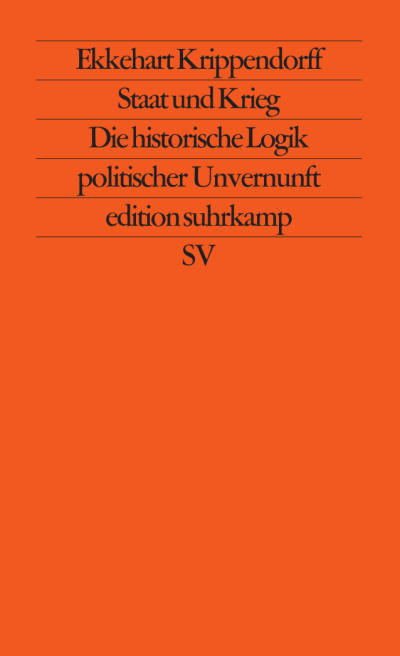State and War / Staat und Krieg
The Historical Logic of Political Irrationality
Despite the dramatic experiences of two world wars and the use of nuclear weapons in the second of these, we have still not emerged from ceaseless cycle of the arms race, which is supposedly the only way to ensure peace. Sartre described the classic adage si vis pacem para bellum (if you want peace, prepare for war) as the great stupidity of the ages. But there is a method, and above all, a logic, to this madness. It is a logic that arises from the organisation of society as a state,...
Read more
Despite the dramatic experiences of two world wars and the use of nuclear weapons in the second of these, we have still not emerged from ceaseless cycle of the arms race, which is supposedly the only way to ensure peace. Sartre described the classic adage si vis pacem para bellum (if you want peace, prepare for war) as the great stupidity of the ages. But there is a method, and above all, a logic, to this madness. It is a logic that arises from the organisation of society as a state, which refers to a political form by which one group of people rule over other people. The rulers – the political classes, the statesmen – act in accordance with an »ethics of responsibility «, claiming for themselves the right not to be judged according to the reason and morality of the subjugated (an »ethics of ultimate ends«). And they have managed to implant this logic of politics – that of an overriding raison d'état – in the minds of those they govern, us, so that even the most unreasonable and absurd things – such as the excesses of the recent arms race – can be sold as reasonable and rational on the market of public opinion.
This process has a long history, and it is important to understand this history if we wish to overcome it. It is the history of the connection between the state and violence, between the state and the military. It is an exciting history, which this book presents not chronologically, but in a backward motion, looking back from the present. It is the story of the evolution of the rule of irrationality, which is not just the irrationality of those in power as manifested in the form of the state and its military apparatus, but also that of the induction of the ruled, the governed, into pathological, idiotic forms of thinking.
This process has a long history, and it is important to understand this history if we wish to overcome it. It is the history of the connection between the state and violence, between the state and the military. It is an exciting history, which this book presents not chronologically, but in a backward motion, looking back from the present. It is the story of the evolution of the rule of irrationality, which is not just the irrationality of those in power as manifested in the form of the state and its military apparatus, but also that of the induction of the ruled, the governed, into pathological, idiotic forms of thinking.
2015, 437 pages
Persons
OTHER PUBLICATIONS
Latest first

Year of Publication: 2016
Ekkehart KrippendorffYear of Publication: 2016
»How the Big People Toy with the Little People«
The oft-invoked unity of theory and practice is something that Goethe realised in his public work as a minister in Weimar. And throughout his whole life – which, it must be noted, spanned the major transformations in Europe and beyond – he reflected upon contemporary issues and on politics more broadly. The politics of his time and contemplations on topics such as domination, war, and power...

Year of Publication: 2000
Ekkehart KrippendorffYear of Publication: 2000
Critique of Foreign Policy
The most ambitious figures on all levels of politics want to go down in history in the field of foreign policy, to truly »govern« and exert power over people in a dramatic fashion. For this reason,...
Rights sold to:
Previously published in the respective language / territory; rights available again: Italy (Fazi)

Year of Publication: 1993
Ekkehart KrippendorffYear of Publication: 1993
Military Critique
In this book, Ekkehart Krippendorf seeks to make targeted interventions in the public discourse on the role of the military. Or perhaps more accurately, to agitate for the emergence of such a discourse, since public debate on the role of the military within society is still caught in an embryonic phase.
